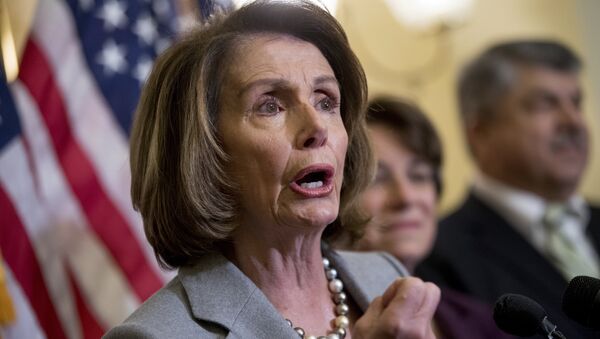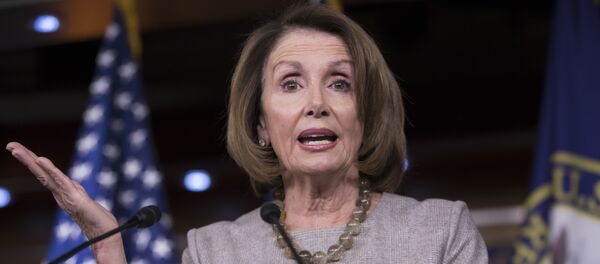More than two dozen Democratic representatives who will be in the House when the next Congress starts in January have dodged questions about whether they will throw their votes behind Pelosi, Roll Call reports. Alexandria Ocasio-Cortez of New York, Lauren Underwood of Illinois and Sean Casten of Illinois are among those Democrats who have shied away from publicly supporting the career lawmaker.
Connor Lamb of Pennsylvania, Jason Crow of Colorado and Abigail Spanberger of Virginia have specifically committed to voting against Pelosi's attempt to regain the speaker's gavel, Roll Call noted.
Conversely, nobody has stepped up to challenge Pelosi. Politico published an extensive report in October stating that House Minority Whip Steny Hoyer of Maryland (the second in command of the Democratic caucus after the minority leader) "still dreams of wielding the speaker's gavel someday." Meanwhile, some analysts suggest that Tim Ryan of Ohio could challenge Pelosi.
For her part, Pelosi's office has told reporters that it is confident in her chances. "Leader Pelosi is confident in her support among Members and Members-elect," Pelosi spokesman Drew Hammill said in a statement to Politico on Thursday. "Democrats don't let Republicans choose their leaders. The election proved that the GOP attacks on Pelosi simply do not work."
But 10 incumbent members and members-elect confirmed to Politico on Thursday that they won't be supporting Pelosi, narrowing the Democrat's margin for error. An anti-Pelosi faction in Washington has already started calling new lawmakers to swell their ranks, telling incoming representatives who have expressed support for "new leadership" within the party, "You're not alone," the Politico report said.
Talib I. Karim, STEM4US! executive director and co-founder, was a counsel to the Committee on Veteran Affairs when the Democrats lost their majority in the House in 2010. Karim joined Fault Lines on Radio Sputnik to discuss the possibility of a legitimate contender emerging to take on Pelosi.
— Fault Lines Radio (@FaultLinesRadio) November 9, 2018
"Eight years ago, I was a counsel to the Committee on Veteran Affairs when we lost — the Democrats lost — the House of Representatives. So, what that meant was that I was out of a job," Karim said.
One dynamic Democrats should consider is the old age of House Democratic leaders Pelosi, Hoyer and James Clyburn (D-SC), Karim said, who are 78, 79 and 78, respectively.
"These are things that should be considered. I gave that little anecdote at the beginning because then, the speaker was Nancy Pelosi, and it was considered that after the election — defeat, when we lost so many houses to the Republicans — that there would be a unanimous consent amongst the Democrats that they would change the leadership. But we saw what happened: she and her colleagues in the establishment Democratic wing of the party did not allow that change to take place," Karim explained.
The hypocrisy Karim teased out is that when Democrats lose like they did in 2010, a good house cleaning is in order. But in the wake of the 2010 defeat, Pelosi and others from the establishment wing remained atop the ranks of Democratic leadership on the merits of being strong fundraisers.
"So they continued to control the Democratic caucus and the positions that come along with that," he said.
"One thing to consider is: What does it mean to be speaker? What it means to be speaker is that you get the chance to basically appoint the key leaders that then go on to appoint who the ranking members or who the chairmen of the various committees will be," Karim explained.
"Those committee chairmen then get a chance to hire significant numbers of staff. So we're talking about millions of dollars of discretion and power that are basically being decided upon in terms of who becomes speaker and who they pick as their lieutenants — the lieutenants being the folks who are chairmen of the various committees. What has to happen in order for anyone to make a run at the chairmanship? They have to assure the people who were in line to become the chairman that, ‘Hey, we're not going to totally shake up standard order.' Meaning that people who were in line to become the chairman because they were the ranking member — when the Democrats take over, because of seniority, they would be in line to become the chairman," said Karim.
"So they're waiting for their shots. They've been waiting for their shots for eight years. So anyone who comes on — Tim Ryan, Kathleen Rice of New York or Connor Lamb of Pennsylvania — what they would have to do to convince enough of the senior folks who are in line to become chairmen that they will have no fear about being placed in those chairman positions. However, some of the folks who want to change things up — they would probably be pushing them to say that not all of them should be given their positions based upon seniority. So that's what really is at stake," he said.
"The issue is seniority. Will the new blood in the Democratic Party be able to cobble together a coalition — again, particularly of the senior Democrats — and convince them that their position, based upon seniority, is not going to go to them, and that they'd be willing to sacrifice discretionary spending worth millions of dollars for the sake of their party? I don't know."





